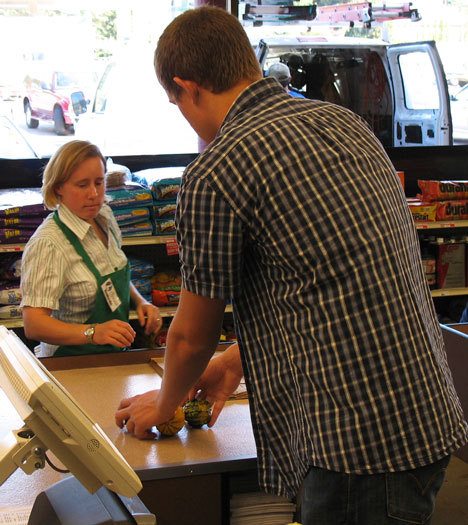Although The Goose grocery store has been open for several days, officials of the nonprofit Goosefoot Community Fund are still contending with questions about the project’s funding and lack of local contractors to renovate the 21,000 square-foot facility.
Goosefoot officials said there are firm reasons why local help wasn’t tapped for the $1.5 million renovation.
“Not using local businesses came as a real disappointment to us, especially after our experience with the Cash Store,” said Goosefoot director Chris Hurley.
In 2004, the Bayview Center was opened after a major renovation carried out by local contractors, artisans, craftsmen and artists.
Hurley noted that the project was fueled by the philanthropy of Nancy Nordhoff.
“We had a choice and a commitment which reflected Goosefoot’s mission of economic development and nurturing local businesses,” Hurley said.
When Casey’s Red Apple closed in the spring, the decision was made to renovate the store as a way to generate revenue, provide local jobs and help smaller businesses at Bayview Corner.
Since Nordhoff’s largesse was unavailable, Goosefoot refinanced through local banks and made application to the Washington Rural Development Loan for the final $500,000 that was needed.
“It was a loan and must be paid back with interest,” Hurley said. “The state required a lot of detail, and the application came under heavy scrutiny before it was approved.”
Hiring local people was a key requirement for the state; hiring local contractors was not.
Hurley said there were three basic criteria involved in finding businesses to do the work: experience, capacity and, most importantly, the cost.
“First, have they done this kind of work before? Grocery stores are very complex, with mechanicals and refrigeration units involved,” she said.
The second concern was whether a particular bidder had the manpower to do the work within the tight 60-day schedule.
“On the refrigeration units alone, there were eight dedicated employees on the job; no island contractor was able to guarantee that level,” Hurley said.
The company that did the interior work had a long history with similar projects and didn’t require a steep learning curve.
And then there was the cost. Those submitting bids with Whidbey addresses came in 20 to 30 percent higher than mainland proposals.
“We had a tight budget of $1.5 million — when the project manager saw the numbers, he just shook his head — which forced us to recycle as many items as we could,” Hurley said.
That’s easily apparent in the new store.
“The bulk fixtures and check-out stands are the only totally-new pieces of equipment in there. We wanted upscale flooring, but at $20,000, couldn’t afford it, so we did the best we could, cleaning and sealing the existing cement,” she explained.
“We had the ambition and desire to do everything perfectly, but not the time or the money,” Hurley added. “The decision to take on ownership and development of the grocery store ourselves after finding no willing or able grocer tenant was an extraordinarily serious risk-taking step for Goosefoot.”
She said that future maintenance and repairs will be covered by local businesses.
Goosefoot financed all building renovations, store inventory and daily operating expenses.
A new corporation was formed between Goosefoot and The Myers Group; essentially, Myers is being hired by the nonprofit to run the store and profits will be folded back into financing other projects, such as affordable housing.
“When there is a profit,” Hurley said.
The Myers Group currently owns and operates markets on Camano Island, Ocean Shores, Snoqualmie and downtown Seattle, though its corporate offices are in Clinton. Owner Tyler Myers was a 1980 graduate of Langley High School.
“We have both the expertise and infrastructure to run a grocery store,” Myers said last week.
The company’s reputation in the industry is well-known, he said.
“We’ve been in business since 1978, with 350 people in our grocery, hardware and convenience operations. Over the years, we’ve had an employee turnover rate of about 10 percent, one of the lowest in our industry,” he said.
As of now, there are 25 full-time jobs and 10 part-time positions being filled by Whidbey Island residents. Myers said his employers receive wages and benefits that are comparable with industry-wide standards.
That works for new Goose checker Belinda Parmenter of Freeland.
“I’m very thankful to be working,” she said. “My husband was the sole provider. When he was hurt recently, I needed a job.”
“The work is good, my employer is fair, the customers are nice and the pay is excellent,” Parmenter said.
Myers isn’t surprised to hear statements like that.
“We need to pay the kind of wages that attract quality people like Belinda,” he said. “Our retirement plan, medical and dental benefits are stronger than most. We plan to be around for quite a while.”
The Goose is open from 7 a.m. to 10 p.m, seven days a week.
For details on Goosefoot, go to www.goosegrocer.com.
Jeff VanDerford can be reached at 221-5300 or jvanderford@southwhidbeyrecord.com.



